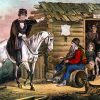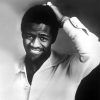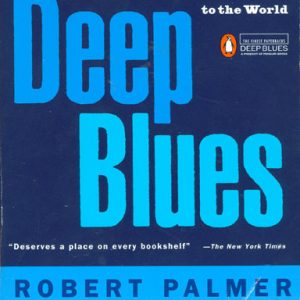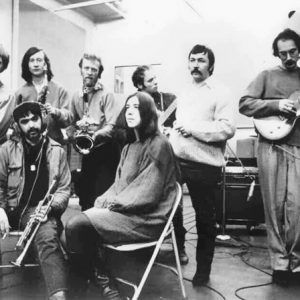calsfoundation@cals.org
Bob Palmer (1945–1997)
aka: Robert Franklin Palmer Jr.
Robert Franklin (Bob) Palmer Jr. was an author, music critic, musician, ethnomusicologist, lecturer, record producer, and documentary filmmaker, not to be confused with the British rock singer of the same name. Critic Greil Marcus called Palmer “one of the few distinguished pop music critics to come out of the South.”
Bob Palmer was born on June 19, 1945, in Little Rock (Pulaski County) to teacher/pianist Robert F. Palmer Sr. and award-winning poet and freelance writer Marguerite Bowers Palmer. He grew up in the lower Pulaski Heights area of Little Rock. He had one sister, a half brother, and a half sister.
From an early age, Palmer had his ear to the radio. Unbeknownst to his parents, the teenaged Palmer sometimes climbed out his bedroom window at night and snuck off to some of the clubs and dives dotting Little Rock’s West Ninth Street to soak up the live music.
Palmer played clarinet in the Hall High School marching band and attended Little Rock University, now the University of Arkansas at Little Rock (UA Little Rock), where he was active in journalism and in the civil rights and peace movements of the 1960s. After receiving a BA in 1967, he moved to New York City. Later, he moved to Hoboken, New Jersey, where he was in an eclectic rock/folk/jazz band, the Insect Trust. The group cut two albums, both cult favorites, Insect Trust and Hoboken Saturday Night.
While continuing to play professionally, Palmer made his foray into music writing by writing freelance articles for Crawdaddy and other publications. In the early 1970s, he began writing for Rolling Stone magazine and became one of its contributing editors.
Palmer’s ability to climb inside a piece of music and describe it in passionate and visceral terms, along with his ability to trace a type of music to its roots, helped establish him as the New York Times’s first full-time popular music critic. He was the paper’s chief pop critic from 1981 to 1988. His abilities also led to many freelance articles for Penthouse, Atlantic Monthly, Journal of American Folklore, and other publications.
Trips to Morocco, India, and Cuba deepened Palmer’s interest in world music. Never one to stay behind a desk, he played clarinet with musicians in Jajouka, Morocco, and immersed himself in their culture. During visits home from New York City, Palmer played with Little Rock jazzmen Walter Henderson and John Stubblefield and with blues guitarist CeDell Davis of Helena-West Helena (Phillips County). Blues music was always central to Palmer’s career, and in the 1990s, he began producing albums for blues label Fat Possum Records. Palmer said he preferred the live sounds of juke joints in the Delta to polished recordings made in studios. He also liked helping musicians gain fame and was instrumental in getting Davis and other musicians gigs and exposure to larger audiences.
One of Palmer’s best-known books is Deep Blues. Published in 1981, it has been used as a textbook in college classrooms and traces the blues from its African roots to the Delta to post–World War II Chicago, Illinois. It is considered a definitive work on the subject. Palmer was screenwriter, narrator, and musical director for the documentary film by the same name and co-directed a documentary film, The World According to John Coltrane. Another of Palmer’s well-known books is Rock & Roll: An Unruly History (1995), a companion to a ten-part miniseries on rock by the British Broadcasting Corporation and the Public Broadcasting Service for which he was the primary consultant. He also authored A Tale of Two Cities: Memphis Rock and New Orleans Roll, Jerry Lee Lewis Rocks, the text for a coffee table book on the Rolling Stones, Baby, That Was Rock and Roll: The Legendary Leiber and Stoller, and collected works from his writings in Rolling Stone magazine. Palmer also wrote many scholarly liner notes for such artists as Ray Charles, Albert King, Charles Mingus, Miles Davis, Yoko Ono, John Lee Hooker, and Ornette Coleman. He lectured at Yale University, Carnegie Mellon University, Bowdoin College, and the University of Mississippi, among other schools. He was the first senior research fellow of the Institute for Studies in American Music while teaching at Brooklyn College in the early 1970s.
Palmer died on November 20, 1997, in the Westchester County Medical Center in Valhalla, New York, of complications from liver disease. He was survived by his fourth wife, JoBeth Briton, and a daughter by a previous marriage. He was cremated in New York, and his remains rest at Roselawn Cemetery in Little Rock. At UA Little Rock’s seventy-fifth-anniversary celebration in 2003, fellow musicians paid tribute to Palmer as someone who cared more about advancing others’ careers than his own. In November 2009, Scribner released a 480-page anthology of Palmer’s writing about music.
For additional information:
DeCurtis, Anthony, ed. Blues & Chaos: The Music Writings of Robert Palmer. New York: Scribner, 2009.
Jennings, Jay. “Going Deep.” Oxford American, February 16, 2017. https://oxfordamerican.org/magazine/issue-95-winter-2016/going-deep (accessed August 10, 2023).
Lensing, Eric G. “Robert Palmer: An Unruly Writer.” Pulaski County Historical Review 47 (Spring 1999): 2–11.
Palmer, Robert. Deep Blues. New York: Viking Press, 1981.
Dorothy Palmer Cox
Little Rock, Arkansas
 Arts, Culture, and Entertainment
Arts, Culture, and Entertainment Divergent Prosperity and the Arc of Reform, 1968–2022
Divergent Prosperity and the Arc of Reform, 1968–2022 Literature and Authors
Literature and Authors Music and Musicians
Music and Musicians Deep Blues by Robert Palmer
Deep Blues by Robert Palmer  The Insect Trust
The Insect Trust 



Comments
No comments on this entry yet.